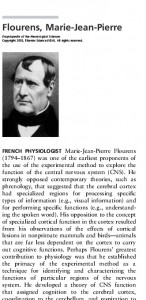![]()
Flourens en la «Encyclopedia of the Neurological Sciences»
FRENCH PHYSIOLOGIST
Marie-Jean-Pierre Flourens (1794–1867) was one of the earliest proponents of the use of the experimental method to explore the function of the central nervous system (CNS). He strongly opposed contemporary theories, such as phrenology, that suggested that the cerebral cortex had specialized regions for processing specific types of information (e.g., visual information) and for performing specific functions (e.g., understanding the spoken word). His opposition to the concept of specialized cortical function in the cortex resulted from his observations of the effects of cortical lesions in non-primate mammals and birds—animals that are far less dependent on the cortex to carry out cognitive functions. Perhaps Flourens’ greatest contribution to physiology was that he established the primacy of the experimental method as a technique for identifying and characterizing the functions of particular regions of the nervous system. He developed a theory of CNS function that assigned cognition to the cerebral cortex, coordination to the cerebellum, and respiration to the medulla.
Flourens was born in Maureilhan, a rural southern French village, on April 13, 1794. He received his medical education at the University of Montpellier in France and in 1814 he went to Paris to study physiology with Georges Cuvier (1769–1832). His initial studies involved research on the physical basis of sensation and led to his receiving the prestigious Montyon prize (1824 and 1825). Flourens was elected to the French Academy of Sciences in 1828 and was promoted to professor of physiology at the……..
EL FISIÓLOGO FRANCÉS MARIE-JEAN-PIERRE FLOURENS (1794-1867) fue uno de los defensores más tempranos del empleo del método experimental para explorar la función del sistema nervioso central (CNS). Él se opuso con fuerza a teorías contemporáneas, como la frenología, que sugerían que la corteza cerebral se hubiera especializado en regiones para procesar los tipos específicos de información (p.ej., la información visual) y para realizar funciones específicas (p.ej., la comprensión la palabra hablada). Su oposición al concepto de función especializada en la corteza fue resultado de sus observaciones de los efectos de lesiones corticales en mamíferos de no- primates y pájaros, animales que son mucho menos dependientes de la corteza para realizar funciones cognoscitivas. Quizás la mayor contribución de Flourens a la fisiología consiste en que estableció la primacía del método experimental como una técnica para identificar y caracterizar las funciones de las regiones particulares del sistema nervioso. Desarrolló una teoría de función de CNS que asignó la cognición a la corteza cerebral, la coordinación al cerebelo, y la respiración a la medula.
Flourens nació en Maureilhan, un pueblo rural del sur francés, el 13 de abril de 1794. Recibió su educación médica en la Universidad de Montpellier en Francia y en 1814 fue a París a estudiar fisiología con Georges Cuvier (1769-1832). Sus estudios iniciales incluían la investigación en la base física de sensación y lo llevaron a la concesión del prestigioso premio Montyon (1824 y 1825). Flourens fue elegido a la Academia francesa de Ciencias en 1828 y fue promovido al profesor de fisiología en el ……..
Tomado de Encyclopedia of the Neurological Sciences 2003, Pages 374–375.
Lectura aconsejada:
- Manual para detectar la impostura científica: Examen del libro de Darwin por Flourens. Digital CSIC, 2013. 225 páginas.


